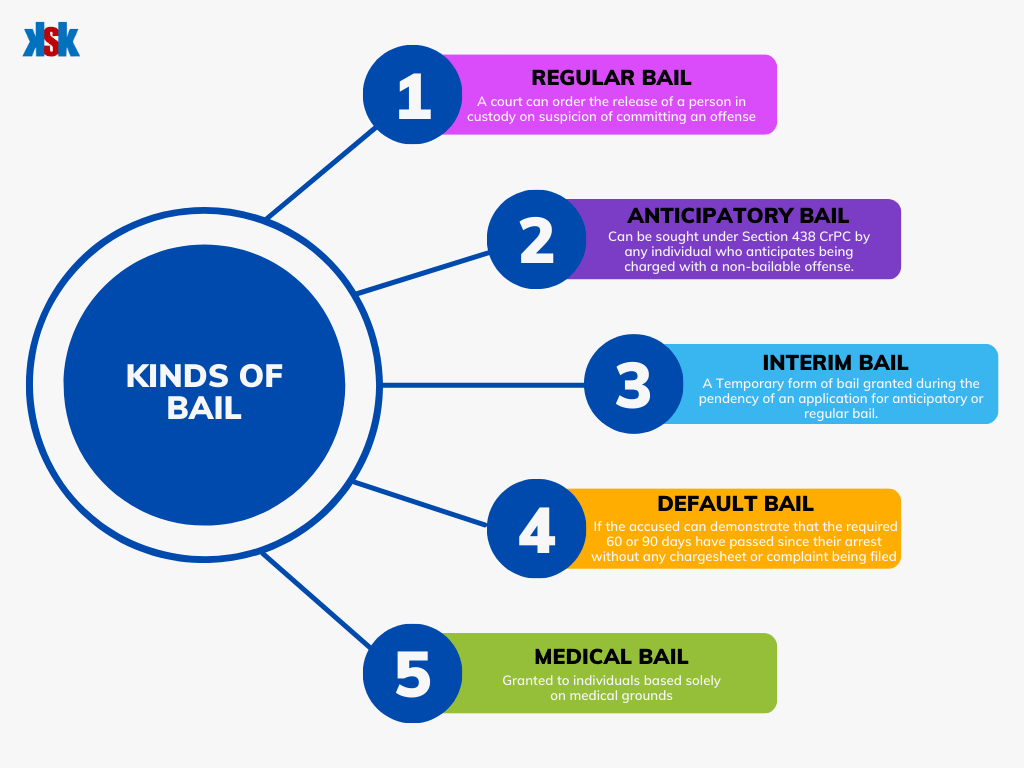Intricacies of Bail in India: Unveiling Different Categories and Impacts

Introduction
Article 21 of the Indian Constitution grants the right to life and personal liberty to every individual. It upholds the fundamental right to live with dignity and personal freedom, which includes the entitlement to seek bail when detained by any law enforcement agency. In India, bail is the legal mechanism that reconciles the accused person’s right to freedom with the public interest of ensuring their appearance in court for trial. It involves the judicial release of an accused person from custody, subject to the condition that they will appear in court at a later stage. Criminal offenses in India are categorized as bailable and non-bailable crimes.
Table of Contents
The provisions and regulations pertaining to bail are outlined in the Code of Criminal Procedure, 1973, specifically from Section 436 to 450. Section 436 stipulates that a person accused of a bailable offense has the right to be released on bail at any stage of the legal proceedings. This means that even if a person is arrested for a bailable offense, they can be promptly granted bail. It is the accused person’s right to obtain bail under this section, and neither the court nor the investigating officer can refuse it.
Section 437 defines the non-bailable offences, bail can be granted at the discretion of the Court on the conditions given under this section. It refers to a Court other than a High Court or Court of Sessions. In a case, it was held that it is on the court to grant bail under Section 437 and it cannot be arbitrary, or vague. In other words, the discretion to grant bail should always be exercised by the court judicially and not according to whim, caprice, or fancy.[1] In the case of Hussainaira Khatoon v State of Bihar, a question was raised about delaying bail and the ambit under Article 21 of the Constitution.[2]
Kinds of Bail

1. Regular Bail
Regular bail refers to a legal mechanism through which a court can order the release of a person in custody on suspicion of committing an offense, with the condition that they do not obstruct the course of justice. This kinds of bail may involve executing a bond with sureties. When a person is arrested for a bailable offense, they have the right to be released as outlined in Section 436 of the Code of Criminal Procedure (CrPC).
The court imposes a statutory duty on the police officer to grant bail upon request. Additionally, the maximum period of detention for an undertrial prisoner is defined, stating that if the accused has been detained for a duration equivalent to 50% of the maximum imprisonment term for the offense during the investigation, they shall be released by the court upon executing a bond, with or without sureties.
On the other hand, for a person detained on suspicion of committing a non-bailable offense, the grant of bail is discretionary, and it can be availed only if a strong case is presented. However, bail for non-bailable offenses can be granted based on specific grounds, including:
- If the accused is below or at 16 years of age.
- If the accused is a woman.
- If the accused is ill or infirm.
- For habitual offenders, bail is granted only under special circumstances.
Section 437 of the CrPC applies to bail petitions submitted in magistrate’s courts. The decision to grant or reject regular bail is based on judicial discretion governed by the regulations outlined in Section 437 of the CrPC. On the other hand, Section 439 applies to bail applications submitted in Courts of Sessions or High Courts.
2. Anticipatory Bail
Anticipatory bail can be sought under Section 438 of the Code of Criminal Procedure (CrPC) by any individual who anticipates being charged with a non-bailable offense. The application for anticipatory bail should be filed in the High Court or Sessions Court having jurisdiction over the alleged crime. Anticipatory bail is sought prior to arrest, and if granted by the court, it prevents the police from arresting the individual. The Supreme Court, in the case of Sushila Agarwal and others v. State (NCT of Delhi) and others, clarified that anticipatory bail remains in effect until the end of the trial and is not limited to a fixed duration.[3]
Certain conditions must be met for the grant of anticipatory bail, including:
- Reasonable Apprehension: There should be a reasonable belief or fear that the accused person may be arrested in connection with the case for which anticipatory bail is being sought.
- Bailable Offense: The offense in question must be bailable, meaning it is eligible for bail as per the provisions of the law.
- Pre-Arrest Application: The application for anticipatory bail must be submitted before the arrest takes place. Once the person is arrested, they would need to seek regular bail.
- Not a Habitual Offender: The person seeking anticipatory bail should not have a history of being a habitual offender.
- No Departure from the Country: After the grant of anticipatory bail, the accused should not leave the country without appropriate permission from the court.
These conditions help guide the court’s decision-making process when considering an application for anticipatory bail.
3. Interim Bail
An interim bail is a temporary form of bail granted during the pendency of an application for anticipatory or regular bail. It provides a brief respite to the accused, temporarily releasing them from custody. However, it is conditional and can be extended based on the circumstances. If the interim bail expires and the accused fails to meet the requirements for its continuation or pay the necessary amount, their right to freedom is revoked, and they may be retaken into custody. Interim bail serves as an interim measure until a final decision is made on the bail application, preventing unnecessary detention of the accused during this period.
4. Default Bail
According to Section 167 of the Code of Criminal Procedure (CrPC), when a person is arrested and the investigation cannot be completed within 24 hours, they must be presented before a Magistrate. The Magistrate can then authorize their detention for a maximum period of 15 days. Typically, this detention period is extended by an additional 15 days to allow the police or investigating agency to complete their investigation. However, Section 167(2) of the CrPC specifies that in cases involving offenses punishable by death, life imprisonment, or imprisonment of at least 10 years, the detention period cannot exceed 90 days.
For other offenses, the limit is 60 days. If the police or investigating agency fails to file a chargesheet or complaint within the specified period, the accused is entitled to default bail. This right is absolute and not at the discretion of the Court. If the accused can demonstrate that the required 60 or 90 days have passed since their arrest without any chargesheet or complaint being filed, the Court is obligated to grant them default bail.
5. Medical Bail
Medical Bail are kinds of bail granted to individuals based solely on medical grounds. It is primarily considered in cases where the person’s health condition requires immediate medical attention or specialized treatment. When medical bail is granted, the Courts typically do not delve into the merits of the case or assess whether the usual criteria for bail are fulfilled. The focus is primarily on the individual’s medical needs and ensuring their well-being.
Grounds for granting bail to both bailable and non-bailable offences
The grounds for granting bail to both bailable and non-bailable offences are based on certain factors. One of the key considerations is the presumption of innocence, where the accused is given the benefit of the doubt regarding their involvement in the crime. Furthermore, an inquiry into the offence is necessary to establish the extent of their involvement. Additionally, bail may be granted if the offence is of a minor nature that does not carry a punishment of imprisonment for ten years or more, life imprisonment, or the death penalty. These factors play a crucial role in determining whether bail can be granted to the accused.
Conclusion
In conclusion, bail serves as an essential aspect of the criminal justice system in India, providing individuals with the opportunity to secure their release from custody during the course of legal proceedings. The Indian Constitution recognizes the right to life and personal liberty, granting individuals the fundamental right to seek bail and live with dignity and personal freedom. The Code of Criminal Procedure, 1973, governs the regulations and procedures related to bail in India.
Bail considerations are based on various factors, including the presumption of innocence, the need for an inquiry into the offence, and the severity of the crime committed. The granting of bail is determined by judicial discretion, ensuring a fair balance between individual rights and the interests of justice.
Overall, bail plays a vital role in safeguarding the rights and liberties of individuals, allowing them to participate in their defence and ensuring their presence in court proceedings. It is an indispensable tool in the criminal justice system, upholding the principles of fairness, protection, and human dignity.
FAQs
Can anticipatory bail be revoked?
Yes, when granting anticipatory bail, the court sets various terms and restrictions that, if violated, may result in the cancellation of such anticipatory bail. The anticipatory bail may be terminated, if the court receives an application from any of the complainant or the prosecution.
What is interim bail?
The interim bail is granted before the hearing for the grant of regular or anticipatory bail and a very short period.
Is it necessary for the individual to obtain regular bail while he already has anticipatory bail?
No, in this case,the individual does not need to get regular bail since their anticipatory bail will be valid until the procedure of trial is completed unless the judge cancels it. In such cases, anticipatory bail is converted to regular bail at the court’s request.
[1]Jai Prakash Singh v State of Bihar (2012) 2 SCC 565.
[2] Hussainaira Khatoon v State of Bihar, 1979 AIR 1369.
[3]Sushila Agarwal and others v. State(NCT of Delhi) and others, 2020 5 SCC 1.
King Stubb & Kasiva,
Advocates & Attorneys
New Delhi | Mumbai | Bangalore | Chennai | Hyderabad | Mangalore | Pune | Kochi
Tel: +91 11 41032969 | Email: info@ksandk.com
By entering the email address you agree to our Privacy Policy.